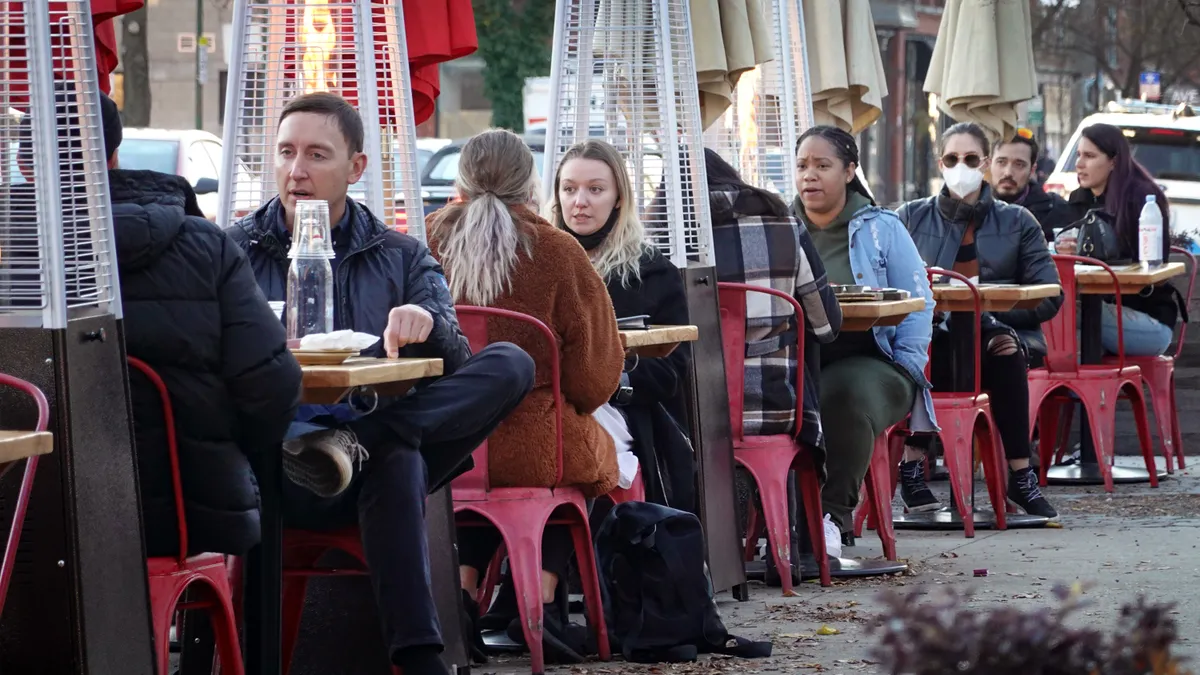Dive Brief:
- The City of Chicago will distribute $2.3 million in grants to 15 community organizations to promote outdoor dining and the creation of community-focused space as part of its Chicago Alfresco program.
- The grant program, which Guinness and Smirnoff parent company Diageo has backed, awarded up to $250,000 each to neighborhood groups for projects including the creation of plaza spaces and the installation of picnic tables and art displays to make open streets and outdoor dining spaces more appealing. The grant program builds on an outdoor dining program the city operated last year and continues to accept applications.
- Other cities also plan to continue allowing restaurants to take up outdoor space. Cities including Boston and New York have extended their outdoor dining programs and leaders in San Francisco, Dallas, Cincinnati and Los Angeles are all seeking to make them permanent.
Dive Insight:
One of the most immediate and visible changes cities made during the COVID-19 pandemic was to open up sidewalk and parking space to restaurants and other businesses, allowing them to comply with social distancing rules and put customers in safer outdoor environments. The street closures proved popular with restaurant owners and customers and were credited with keeping some restaurants afloat.
Now, as cities prepare for a return to normal as vaccinations increase and case numbers decline, restaurant owners are pushing for the changes to be made permanent.
“This was a critical lifeline for the industry throughout the pandemic,” said Mike Whatley, vice president for state affairs and grassroots advocacy at the National Restaurant Association. “Now it’s something that customers love, and it’s a way for restaurants to serve more customers. Restaurants need every single policy priority that is available for them to keep this going.”
Last month, the association sent a 12-step “State and Local Blueprint for Rebuilding” to policymakers, including a recommendation that governments permanently expand outdoor dining. Among the industry’s other goals were establishing a restaurant grant fund, permanently extending to-go alcohol sales and expanding child care access for hospitality workers.
According to an April survey of 2,500 restaurant operators by the National Restaurant Association Research Group, 57% of operators say they offer outdoor dining on spaces like a patio, deck or sidewalk, up from 40% in February but below the 67% who offered outdoor dining in September 2020. Of the operators who had expanded outdoor seating in the past year, 90% said they would continue it if their jurisdiction were to allow it.
Chicago Alfresco has a focus not just on helping restaurants expand outside, but on helping community groups make outdoor spaces more appealing. For example, the Austin Chamber of Commerce, representing a neighborhood on Chicago's West Side, received a grant to install planters and enhance pockets of arts and cultural spaces. “A spotlight will now be on the rich arts and cultural community that exist in this neighborhood while enhancing the curb appeal of restaurants and creating an enjoyable and relaxing atmosphere outside of those restaurants,” Tina Augustus, the group’s executive director, said in a statement.
Other cities are extending their own temporary outdoor dining programs or looking to relax regulations to help restaurants keep their pandemic-era setups. Existing zoning, health and transportation regulations can pose challenges, however, especially as downtowns reopen and there is more competition for sidewalk and curb space.
In San Francisco, for example, the city’s Board of Supervisors has delayed a decision on Mayor London Breed’s proposal to extend outdoor dining, citing concerns about disability access, the San Francisco Chronicle reports. In a March survey of mayors, just over a third said they expect pandemic-inspired changes like outdoor dining to remain permanent, citing budget and policy concerns as why they might not.
Brian Warrener, an associate professor at the Johnson & Wales University College of Hospitality Management in Providence, Rhode Island, said the challenges the restaurant industry still faces make it “important for city leaders to recognize the significance of outdoor dining all over the country.”
“Necessity is the mother of invention, and out of these tough times for restaurants came a whole host of new ways to do business,” Warrener said in an email. “Restaurants operate on the thinnest of margins, so making their goods and services available to more consumers utilizing a variety of distribution methods can improve volume, margins and overall profit, creating a solid base of operations for those restaurants fortunate enough to move forward under these circumstances.”











